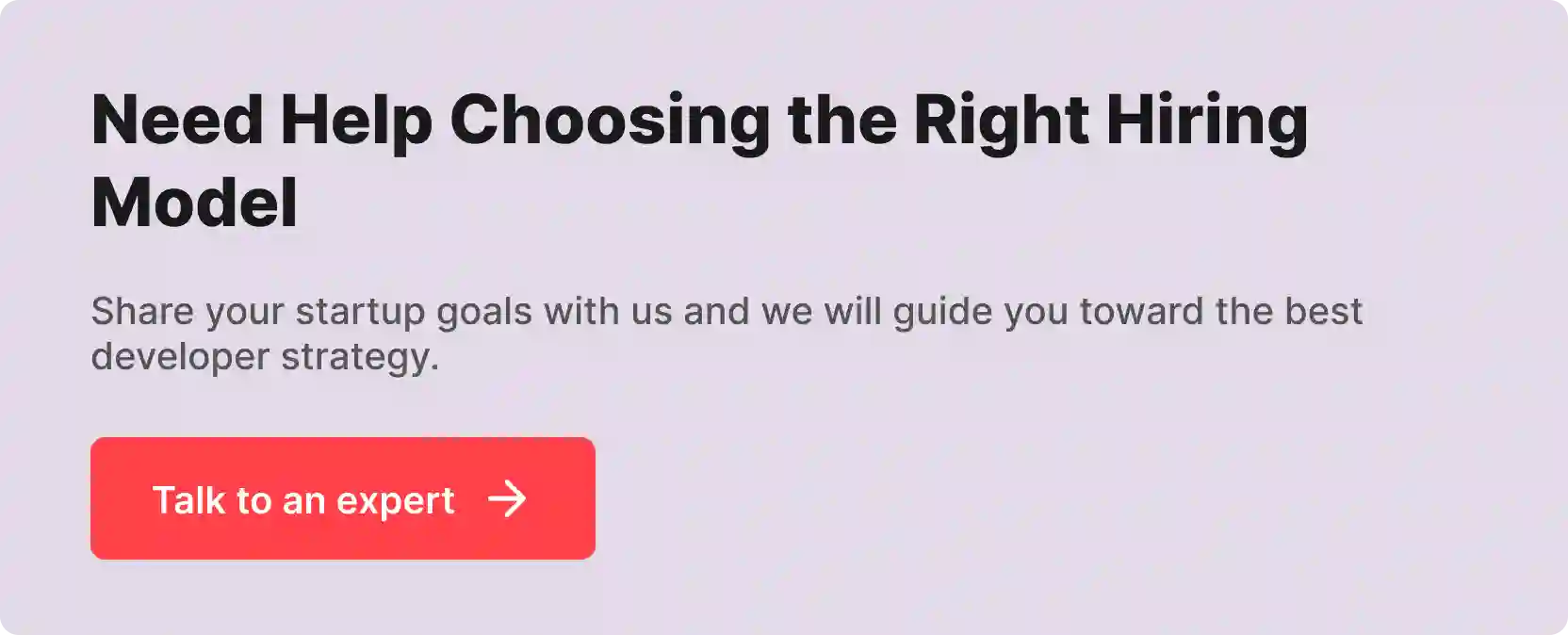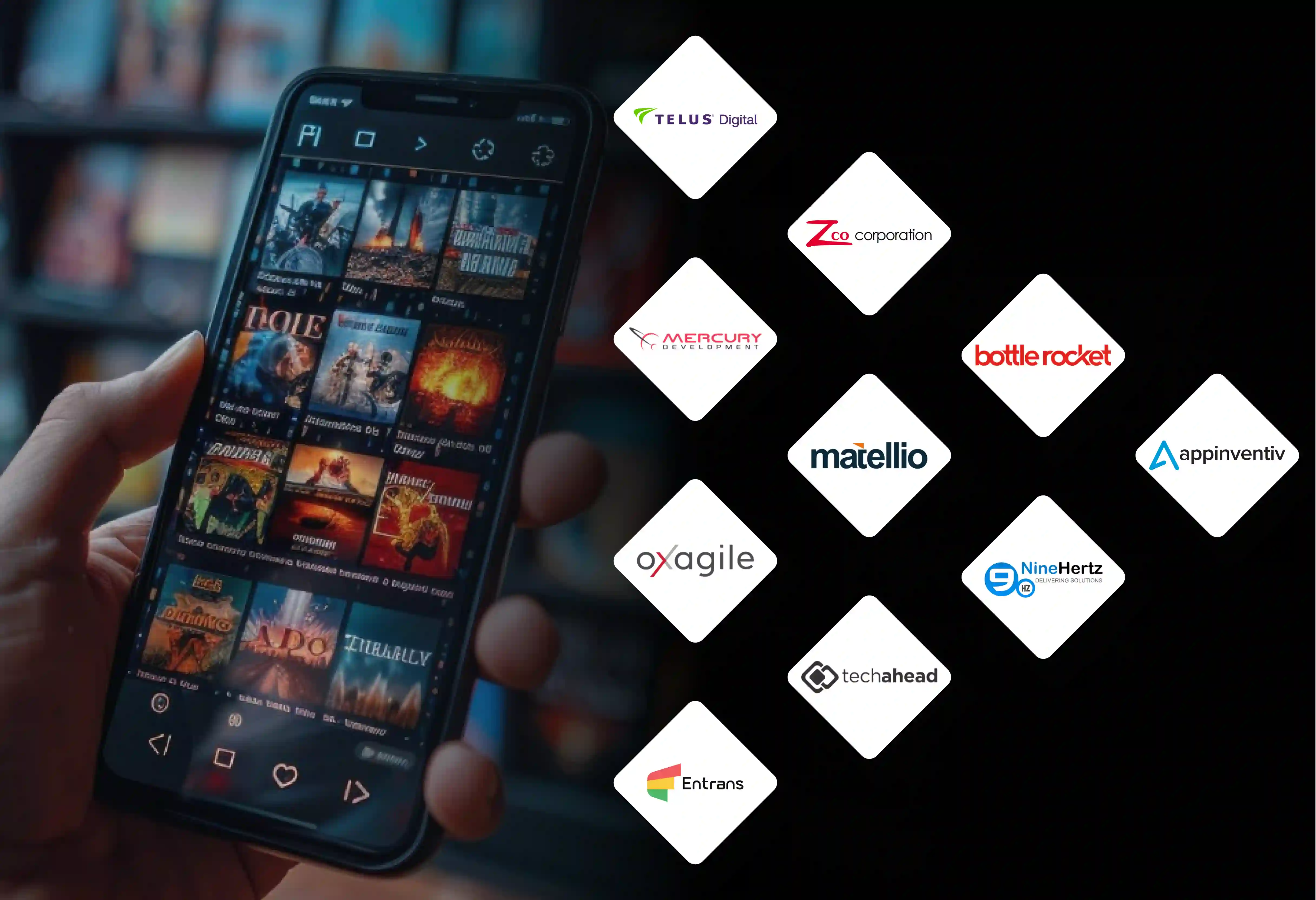Every startup has an idea, but success depends on whether it is transformed with the right person. Hiring the right developer is one of the important decisions to be made carefully. We need to answer questions such as where to start, whom to trust, and how to assess someone to find a developer. The challenge lies in finding a person who can understand product goals and adapt quickly. With a proper plan and strategy, we can streamline this process.
This article will explain the clear-cut steps to define your requirements, compare developer types, and guide you on how to hire a developer for a startup.
Why hiring the right developers matters for startup success
Hiring the right developers is critical for a startup’s success. The key reasons why it matters so much are
- Product quality and speed to Market: Talented developers help accelerate speed to market and ensure higher code quality. This will be a notable feature for startup to launch their product faster in the market. High-quality code is scalable and easy to maintain.
- Innovation: Skilled developers build creative solutions to technical challenges and contribute innovative ideas that differentiate your product in the market.
- Security: Developers integrate security practices from the start, protect sensitive data, and reduce costly security breaches. This step is important to bring in a good reputation for the startup.
- Scalability: The ability to scale up and down the development team according to project changes and leverage global talent pools gives startups flexibility and agility as market needs shift.
- Collaboration and culture: beyond technical skills, the skilled developers possess good communication skills, teamwork, and problem-solving skills. Good developers who align with the startup’s mission, values, and fast-paced environment will be more loyal to the employer.
- Cost and Resource Management: A good hiring decision will save 50 % of the cost to the startups. Selecting a poor developer will cause only wastage of time, recruitment costs, and more risks. The right person will minimize the risk.

Decide on your approach to hiring developers for your startup.
Deciding on the approach to hire developers for a startup is a foundational strategic decision. Clearly identify the skills, experience levels, and technologies that are essential for your product development and future scaling.
In-House Developers:
Consider in-house developers if you need a stable, dedicated team.
Pros:
- Full control of your vision
- Faster collaboration and communication
- Long-term stability
Cons:
- The time taken to hire them is longer
- High cost
- Needs leadership
Freelance Developers:
Choose freelance developers with minimal commitment, such as building an MVP or testing an idea.
Pros:
- Cost-effective
- Easy to hire
Cons:
- Limited availability of developers
- Requires strong project management
Staff Augmentation:
Choose it when you want a stable team.
Pros:
- Cost-effective
- Managed HR, payroll, and admin
Cons:
- Requires a clear communication process
Outsourcing:
Choose it when you need full ownership of your product execution.
Pros:
- End-to-end development
- Good for non-technical people
Cons:
- Higher cost than freelancers
- Less control is needed than in other models
Step-by-step hiring framework for startups
The step-by-step hiring framework tailored for startups is
1. Define the needs:
Clearly clarify what our startups need, technically based on what you want to build, your key features, and product goals. Check whether you need a developer for MVP, scaling, adding features, or adding additional experts to your existing team. This will reduce the guesswork and ensure the selection of the right candidate.
2. Select the hiring model:
Now it is time to select the way to hire top developers. Decide whether you need an in-house developer or a freelancer. Your budget and timelines will be the deciding factor for this decision. Choose the hiring model that supports both immediate development and long-term growth.
3. Job description:
Mention a job description that clearly explains your needs and responsibilities for the job. Prefer experienced candidates if the position has a lot of challenges. A clear job description attracts qualified developers. With this, we can easily filter out the candidates.
4. Location to hire from:
Geographical location also plays a role in selecting the right candidates. If the startup accepts remote candidates, then we need to consider the country from which the developer is being hired. Some parts of the world offer outsourced candidates at reduced cost. The startup needs to consider the cost of hiring a developer.
5. Source candidates:
Before hiring developers for a startup, we need to first search for candidates. Using a multichannel approach, like job boards, internal referrals, LinkedIn, developer communities, GitHub, and hiring platforms or agencies, to reach out to the talented candidates. If using agencies or platforms, choose partners with experience.
6. Screen and Assess candidates:
Start with the initial screening of the candidates. Filter for basic qualification, compensation, expectations, and motivation. Check their relevant experience, past projects, and alignment with your technology skills. Interview to check their technical skills and their communication skills. Check whether they can accept feedback, not just the final solution.
7. Onboard and set clear goals:
If the right person is found, provide a structured onboarding experience with clear communication of project goals and team dynamics. Begin with a pilot project and check their working style. Invest in the retention of the developers, give competitive packages, and maintain a positive startup culture.
Hiring for special cases like AI data and platform engineering
When hiring for special cases like AI data engineering and platform engineering, a targeted approach is essential due to specialized skills.
- Define specific project: For AI data engineers, this includes expertise in ETL/ELT workflows, data warehousing, and real-time data streaming, data governance, and analytics collaboration. For platform engineers, focus on their design skills, cloud computing knowledge, DevOps, and integration capabilities.
- Look for strong technical knowledge: AI development needs more practical experience with real datasets, model deployment, and performance optimization. So when considering selecting an AI candidate, look for their proven years of experience with built and deployed machine learning or generative AI solutions in production. When looking for data engineers, check their ETL frameworks, cloud platforms, database technologies, and workflow automation.
- Culture and collaboration: Since Data scientists work closely with product managers and business stakeholders. Check and translate business requirements into testable hypotheses and explain complex results to a non-technical audience.
- Use a practical Assessment: Real-world experience is the best way to evaluate specialized engineers. Evaluate the data sets and model-building exercises for the AI engineers. For data engineers, test their ability to design or optimize a pipeline. Handling of practical assessments will tell us how developers approach the problems.
- Security and Reliability: Platform engineers are gatekeepers. Test their knowledge of security best practices (eg, secrets management, least privilege access, supply chain security).
Cost and timeline examples for hiring developers
The cost and timelines for hiring a software developer vary based on location, complexity, tech stack, availability, quality, hiring model, and seniority.
| Hiring Model |
Cost (Hourly / Monthly) |
Timelines |
| In-House Developer |
$80 - $120/hr, $70,000 - $130,000/year |
Around 6–10 weeks (including sourcing, interview, and start date) |
| Freelancer |
$20 - $50/hr |
Around 2–3 weeks (including sourcing, interview, and start date) |
| Dedicated offshore teams |
Approx. $18,000/month for a 7-member team |
Around 2–3 weeks (including sourcing, interview, and start date) |
Timeline examples:
- It will take around 2 days to several weeks to hire the developer. It is done depending on market conditions and the role's seniority.
- Onboarding the developer typically takes around 1 to 4 weeks, and it depends on project complexity and team setup.
- Schedule a pilot project phase, which will last for a few weeks to validate skills and teams.
Common hiring pitfalls and how to avoid them
Common pitfalls include rushing the process, neglecting cultural fit, skipping skills testing, and ignoring long-term needs.
- Hiring too quickly: Startups often rush the process due to timelines and budget constraints. This leads to compromise, misfit hires, and costly turnover. To overcome these, use a clear framework and stick to it.
- Compensation: Startups can’t really afford the high salary provided by big organizations. To overcome this, set a transparent and clear equity. Founders must clearly articulate the potential upside of the equity.
- Hiring without a clear strategy: It is one of the most common mistakes to start the hiring process. Without a defined scope or technical expectations, it will get the wrong candidates and lead to misalignment once development begins. To overcome this, document core features, tech stack preference, timeline, and expected outcome before sourcing candidates.
- Prioritizing speed over quality: One of the challenges we face is just filling the position without considering their skills. To overcome this, use coding tests, problem-solving challenges, and interviews to evaluate the skills.
- Validate experience: Just seeing and trusting the resumes alone will not do the job. We need to validate the developer’s experience. To overcome this, check portfolios, validate references, and review past project outcomes.
- Weak onboarding and management: The Onboarding process is also considered. It might create confusion and delay productivity even with the right hires. To mitigate this, streamline the onboarding process, establish guidelines, and ensure integration with the team and culture.
How Entrans helps startups hire and build products faster
Entrans helps startups hire and build products faster by providing a comprehensive AI-led digital engineering and transformation service.
- Staff augmentation: We provide pre-vetted developers who are already evaluated for technical skills, communication, and work discipline. This reduces the hiring friction and enables immediate focus on product delivery without the overhead of recruitment and HR management handled by Entrans.
- Flexible models: We offer flexible engagement models such as single developers, dedicated teams, and full product development support. Startups can choose the models based on their tasks.
- AI-led Engineering: We focus on an AI-first Agentic approach that allows startups to integrate cutting-edge AI features and automation to launch their products faster.
- CI/CD Automation: We integrate Continuous Integration/ Continuous Delivery (CI/CD) pipelines and automated testing. This leads to faster release cycles and higher product reliability.
- Rigorous screening: We perform rigorous quality testing by doing background checks and continuous performance monitoring to ensure startups collaborate with reliable professionals. This makes sure only a qualified person gets selected.
When partnering beats hiring for startup growth
Partnering with a team like Entrans gives you the speed, specialized skills, and flexibility. Startups may get the following benefits.
- Faster-time-to market
- Access to specialized or niche talent
- Cost reduction and minimal risks
- Scaling
- Flexibility
- More focus on business agility
Want to know more about how we provide skilled developers according to your needs? Book a consultation call.









